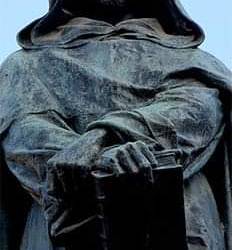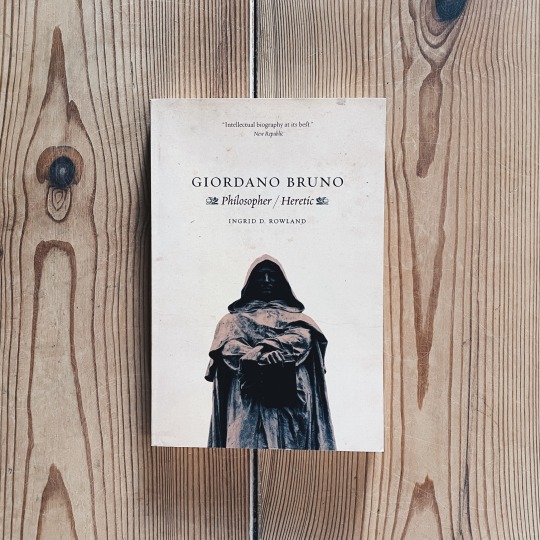#GIORDANO BRUNO
Explore tagged Tumblr posts
Text

Detanico Lain [Angela Detanico and Rafael Lain], Infini / from Giordano Bruno, 1584, (wall painting; dimensions variable), 2018, Unique work of a series of 5 [Martine Aboucaya, Paris. © Detanico Lain]

#art#visual writing#typography#mixed media#detanico lain#angela detanico#rafael lain#giordano bruno#martine aboucaya#2010s
92 notes
·
View notes
Text
Divinity reveals herself in all things, everything has divinity latent within itself. For she enfolds and imparts herself even unto the smallest beings, and from the smallest beings, according to their capacity. Without her presence nothing would have being, because she is the essence of the existence of the first unto the last being.
The Expulsion of the Triumphant Beast
Giordano Bruno
106 notes
·
View notes
Text
Italian literature tournament - Third round.


Propaganda in support of the authors is accepted, you can write it both in the tag if reblog the poll (explaining maybe that is propaganda and you want to see posted) or in the comments. Every few days it will be recollected and posted here under the cut.
12 notes
·
View notes
Text
«Gutta cavat lapidem non bis sed saepe cadendo:
sic homo fit sapiens bis non, sed saepe legendo».
«La goccia scava la pietra cadendo non due volte, ma continuamente;
così l'uomo diventa saggio, leggendo non due volte ma spesso».
Giordano Bruno (probabilmente ispirato da Lucrezio...).

#giordano bruno#poesia d'autore#italia#poesia#canzoni italiane#frasi canzoni#poesia corta#poetry#canzoni#citazioni#poesia in prosa#poesia italiana#latino#saggio#frasi filosofia#citazioni filosofiche#frasi filosofiche#filosofía
16 notes
·
View notes
Text
What would have happened if what lived in the hearts of the greatest individuals – Nicolaus Cusanus, Paracelsus, Agrippa, Giordano Bruno, and Campanella – would have entered the hearts of everyone? […] What if the old and the new had met and intermingled, spirit with blood, and blood with spirit?
— Gustav Landauer, Revolution and Other Writings: A Political Reader, transl Gabriel Kuhn, (2010)
#German#Gustav Landauer#Revolution and Other Writings: A Political Reader#Gabriel Kuhn#(2010)#Nicolaus Cusanus#Nicholas of Cusa#Paracelsus#Heinrich Cornelius Agrippa#Giordano Bruno#Tommaso Campanella#What if? What if? What if...
21 notes
·
View notes
Text
Because our knowledge is ignorance, or because it is neither knowledge of anything there nor the understanding of any truth, or because even if there is some entrance to that [truth], the door may not come open except by means of ignorance — which is simultaneously path, gatekeeper, and gate.
Giordano Bruno, from The Cabala of Pegasus
35 notes
·
View notes
Text

7 notes
·
View notes
Text
"È delle anime sordide pensar come il volgo sol perchè il volgo è maggioranza."
(Giordano Bruno)
19 notes
·
View notes
Text

Maiori forsan cum timore sententiam in me fertis quam ego accipiam.
Non mi vergogno d'aver sopportato la povertà, la malevolenza e l'odio dei miei, le esecrazioni, le ingratitudini di coloro ai quali volli giovare e giovai, gli effetti d'un'estrema barbarie e d'un'avarizia sordidissima. Per il che non mi duole d'esser incorso in fatiche, dolori, esilio: ché faticando profittai, soffrendo feci esperienza, vivendo esule imparai: ché trovai in breve fatica lunga quiete, in leggera sofferenza gaudio immenso, in un angusto esilio una patria.
Giordano Bruno, 17 febbraio 1600, Campo de' Fiori, Roma
42 notes
·
View notes
Text
Campo dei Fiori by Czeslaw Milosz

Czeslaw Milosz, 30 June 1911 – 14 August 2004, 1980 Nobel Prize in Literature winner.
---
In Rome on the Campo dei Fiori baskets of olives and lemons, cobbles spattered with wine and the wreckage of flowers. Vendors cover the trestles with rose-pink fish; armfuls of dark grapes heaped on peach-down.
On this same square they burned Giordano Bruno. Henchmen kindled the pyre close-pressed by the mob. Before the flames had died the taverns were full again, baskets of olives and lemons again on the vendors' shoulders.
I thought of the Campo dei Fiori in Warsaw by the sky-carousel one clear spring evening to the strains of a carnival tune. The bright melody drowned the salvos from the ghetto wall, and couples were flying high in the cloudless sky.
At times wind from the burning would drift dark kites along and riders on the carousel caught petals in midair. That same hot wind blew open the skirts of the girls and the crowds were laughing on that beautiful Warsaw Sunday.
Someone will read as moral that the people of Rome or Warsaw haggle, laugh, make love as they pass by the martyrs' pyres. Someone else will read of the passing of things human, of the oblivion born before the flames have died.
But that day I thought only of the loneliness of the dying, of how, when Giordano climbed to his burning he could not find in any human tongue words for mankind, mankind who live on.
Already they were back at their wine or peddled their white starfish, baskets of olives and lemons they had shouldered to the fair, and he already distanced as if centuries had passed while they paused just a moment for his flying in the fire.
Those dying here, the lonely forgotten by the world, our tongue becomes for them the language of an ancient planet. Until, when all is legend and many years have passed, on a new Campo dei Fiori rage will kindle at a poet's word.
Warsaw, 1943
"Campo dei Fiori" from The Collected Poems 1931-1987 by Czeslaw Milosz. Copyright © 1988 by Czeslaw Milosz Royalties, Inc. Reprinted by permission of HarperCollins Publishers.
#poetry#poemsociety#poemblr#poem#poems and poetry#czeslaw milosz#campo dei fiori#david brooks#louis iribarne#the collected poems of czeslaw milosz#the collected poems 1931 to 1987#warsaw#rome#giordano bruno
24 notes
·
View notes
Text
“Unless you make yourself equal to God, you cannot understand God: for the like is not intelligible save to the like. Make yourself grow to a greatness beyond measure, by a bound free yourself from the body; raise yourself above all time, become Eternity; then you will understand God. Believe that nothing is impossible for you, think yourself immortal and capable of understanding all, all arts, all sciences, the nature of every living being. Mount higher than the highest height; descend lower than the lowest depth. Draw into yourself all sensations of everything created, fire and water, dry and moist, imagining that you are everywhere, on earth, in the sea, in the sky, that you are not yet born, in the maternal womb, adolescent, old, dead, beyond death. If you embrace in your thought all things at once, times, places, substances, qualities, quantities, you may understand God.”
― Giordano Bruno
14 notes
·
View notes
Text
Divine love does not weigh down, nor carry his servant captive and enslaved to the lowest depths, but raises him, supports him and magnifies him above all liberty whatsoever.
The Heroic Enthusiasts
Giordano Bruno
63 notes
·
View notes
Text
Italian literature tournament - Second round.


Propaganda in support of the authors is accepted, you can write it both in the tag if reblog the poll (explaining maybe that is propaganda and you want to see posted) or in the comments. Every few days it will be recollected and posted here under the cut.
12 notes
·
View notes
Text
«Sul finire del Sedicesimo secolo la volta celeste si alzava, come la vediamo noi ancora oggi, non di venti metri come nel planetario, ma circa a non più di trenta chilometri sopra di noi, come un’inflessibile costruzione. Sopra questa fortezza celesta troneggiava il malefico Dio, la cui vista penetrava in tutti gli errori degli uomini, che puniva senza pietà con la guerra, la peste, gli incendi. La volta celeste, che sosteneva i palazzi e i giardini di Dio, cingeva come un guscio d’uovo la Terra liberamente sospesa nel vuoto. «A questo punto entrò in scena Giordano Bruno e ruppe il guscio dell’uovo cosmico aprendo lo sguardo meravigliato e felice dell’umanità sull’infinità dello spazio. Le stelle fisse non erano più i bottoni dorati inchiodati all’immobile parete celeste, ma divennero barche dorate che si muovevano liberamente nell’etere a grande distanza le une dalle altre. Tutta la magnificenza dei palazzi divini si era volatilizzata. Se fossi un grande artista come lei», disse lo zoologo volgendosi ora al pittore, «progetterei un affresco imponente che, come contraltare del Giudizio Universale di Michelangelo, raffiguri Giordano Bruno sul rogo. Ma le fiamme, che devono bruciarlo, salgono verso il cielo e incendiano la volta celeste come fosse una misera quinta teatrale. Si vedrebbero quindi la città di Dio con i suoi opulenti palazzi crollare, dissolvendosi nel fumo e nella cenere, e insieme ad essi cadrebbero vittime dell’eterna distruzione angeli e santi. In lontananza, le stelle dell’Orsa Maggiore, come sfere luminose, apparirebbero in segno di vittoria.»
Jakob von Uexküll, L'immortale spirito nella natura, traduzione dal tedesco di Nicola Zippel, Castelvecchi (collana I Timoni), 2014. [Libro elettronico]
[Edizione originale: Der unsterbliche Geist in der Natur, Christian Wegner Verlag, Hamburg; testo pubblicato in tre parti fra il 1938 ed il 1947]
#libri#letture#leggere#saggi#saggistica#Giordano Bruno#Jakob von Uexküll#scienza#scienze#conoscienza#biologia#libertà di pensiero#Nicola Zippel#astronomia#teologia#atei#libero pensiero#ateismo#etologia#ecologia#agnosticismo#libertà di parola#agnostici#umwelt#ambiente#percezione#filosofi#filosofia#fenomenologia#semiotica
14 notes
·
View notes
Text

“The idea of man as a microcosm, expressed so many times in the philosophical and mystical literature of old and new times, nowhere receives such an in-depth interpretation as in Kabbalah”.
— S. N. Bulgakov “Non-Evening Light”
“Sciences such as theology, philosophy and mathematics take their principles and roots from it [Kabbalah]. Therefore all these sciences (scientiae) are subordinate to this wisdom (sapientia); and their principles and rules are subordinate to her principles and rules; and therefore their argument is insufficient without it”.
— R. Lull “Works of Raymond Lull”
“Kabbalah gives the highest principle an unpronounceable name; from it she derives, in the form of an emanation of the second stage, four principles, of which each again branches into twelve, and these, in turn, into 72, etc.... to infinite further ramifications, just as there are an infinite number of species and subspecies... And, in the end, it turns out that everything Divine can be brought to one Primary Source, just as all the light that shines primordially and by itself, and the images that are refracted in many mirrors and in as many separate objects, can be brought to one to the formal ideal principle – the Source of all these images”.
— G. Bruno “Italian Works”
17 notes
·
View notes
